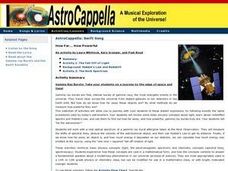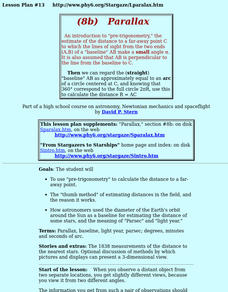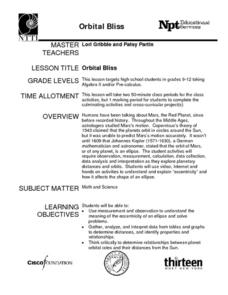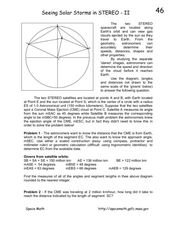Curated OER
How Far... How Powerfu
Students work with a real optical spectrum of a gamma ray burst afterglow taken at the Keck Observatory. They measure the shifts of spectral lines, deduce the velocity of the astronomical object, and then use Hubble's Law to get its...
Curated OER
Mathematics at the Frontier of Astronomy
Middle schoolers explore the different types of measurements used in astronomy. In this space science instructional activity, students explain the relationship between planets' orbits and distance from the sun using Kepler's Laws. They...
Curated OER
WebQuest Solar System Colonization Project 2000
Sixth graders complete a WebQuest to study the names and locations of the planets in the solar system. They investigate the causes of the seasons and the distance between the planets using astronomical units. They use technology to...
Curated OER
Biography of a Star: Our Sun's Birth, Life, and Death
Students examine how astronomers use parallax to determine the distances of stars in the Sun's neighborhood. They construct a pinhole protractor, and measure angles and calculate distances.
Curated OER
Speed of Light
In this speed of light activity, learners read about Danish Astronomer ole Roemer and his discovery of the speed of light. Students complete 4 short answer questions based on the reading.
Curated OER
Physics of Space Flight
In this space flight worksheet, learners will review physics terms relating to space which includes measuring the distance of space objects, how rockets work, and electromagnetic waves. This worksheet has 10 terms in a crossword puzzle,...
Curated OER
How Far...How Powerful
Students explore the concept of gamma ray bursts. They examine basic physics concepts about light, measure the shifts of spectral lines, and utilize Hubble's Law to deduce the velocity of an astronomical object.
Curated OER
20th-Century Astronomy
Students examine and explain how the distance to nearby stars can be measured by the parallax method, discuss the role of women in the history of American astronomy, form their own opinions of the importance of Harlow Shapley and Edwin...
Curated OER
The Sounds of Summer
Students experiment with measuring the speed of sound in an open field by clapping hands and measuring the time delay between the clap and hearing the sound at a long distance. Students practice solving equations at completion of activity.
Curated OER
Parallax
Students discover how astronomers used the diameter of the Earth's orbit around the Sun as a baseline for estimating the distance of some stars, and the meaning of "Parsec" and "light year."
EngageNY
The Motion of the Moon, Sun, and Stars—Motivating Mathematics
What does math have to do with the behavior of the earth and sun? Learn how the movement of celestial bodies has influenced the development of trigonometry. Scholars connects the details in mathematics to their...
Curated OER
Notes: Characteristics of Stars
Students investigate stars and the solar system by completing a worksheet. For this space science lesson, students complete a fill in the blank worksheet based on the stars and components of the cosmos.
Adrian College
The Universe
Young scientists create a simulation of Hubble's law. Introducing the Big Bang Theory using balloons and a simple lab worksheet, scholars complete a data table and perform analysis.
Curated OER
WebQuest Solar System Colonization Project 2000
Sixth graders investigate the livability of different planets in the universe by researching and organizing information from a number of sources in this unit project. They decide on a location for a space station which they support in an...
Curated OER
Quiz: Astronomy
In this science worksheet, 3rd graders will focus on various aspects of astronomy. Students will respond to ten questions all pertaining to stars, constellations, planets, and our solar system.
Curated OER
Orbital Bliss
Most young mathematicians are aware that the planets don’t orbit the sun in a circle but rather as an ellipse, but have never studied this interesting feature. This resource looks at the planetary orbits in more detail and helps learners...
Curated OER
Location
Students explore the tools used by Columbus to chart his latitude. They study the change of a location over time.
Curated OER
Seeing Solar Storms in STEREO-II
In this solar storms activity, learners use a diagram given the location of two STEREO spacecraft satellites, a coronal mass ejection, the sun and the Earth to solve 2 problems about the coronal mass ejection. Students use segments,...
Curated OER
Getting an Angle on the Sun and Moon
In this Sun and Moon worksheet, students solve 6 problems about the angular scale of the images given, the size of the features on the images and the area of the features shown.
Curated OER
Heliocentric and Geocentric Models
For this worksheet, learners read an informational article and view drawings of the two models. In this comprehension worksheet, students answer twelve questions.
Curated OER
Star Count
Fourth graders explore the night sky with their star counter. They to determine the types of stars and the number that can be seen from their local area and share their data via the Internet. They participate in NASA online projects.
Curated OER
Black Holes...V
In this black hole learning exercise, students read about the black hole in the center of the Milky Way Galaxy called Sagittarius A and observe a Chandra image of the area where the black hole exists. Students solve two problems which...
Curated OER
A Trillion Here...A Trillion There
In this working with large numbers worksheet, students are given the finance statistics for the US and the world for the 2006-2007 year. Students solve 11 problems including finding averages and percentages for the given statistics and...
Curated OER
The Hand of Chandra!
In this nebula learning exercise, students read about the Chandra X-ray Observatory that captured the given image of a pulsar and its nebula. Students solve 3 problems including using similar triangles and proportions to find the image...

























